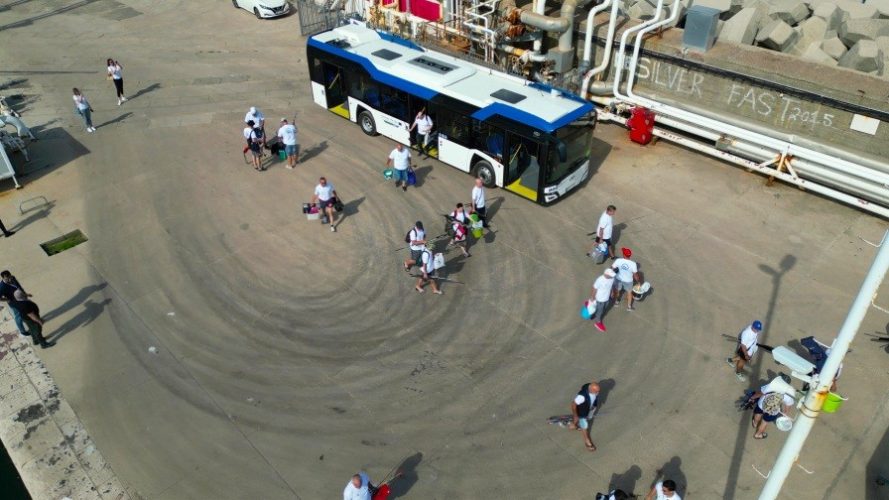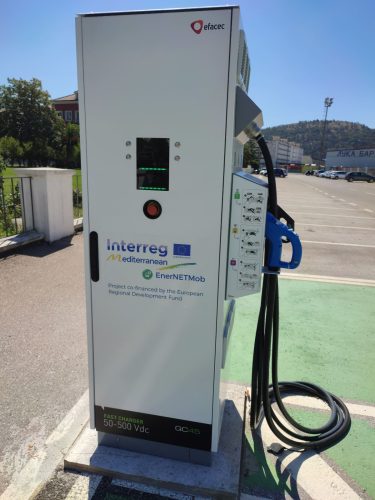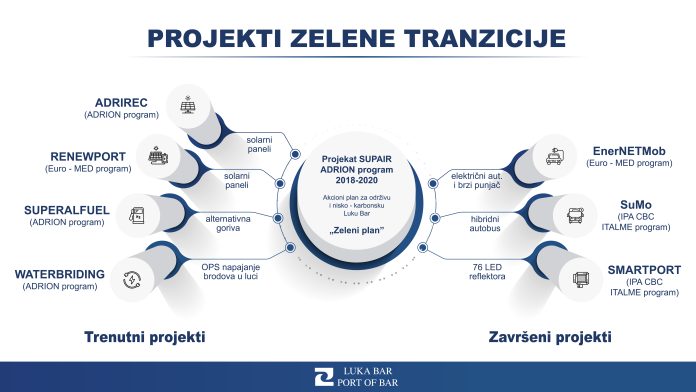The decarbonization of the transport sector is one of the key elements of the green transition. The maritime industry presents a particular challenge on this path, given its significant impact on the environment. These challenges are continuously recognized by the Port of Bar, which, with the support of European Union funds, is actively working to establish an environmentally sustainable business model.
From 2007 to today, the Port of Bar has implemented as many as 34 projects financed through the Interreg cooperation mechanism, utilizing over 5 million euros in non-repayable EU funds. Of that number, eight projects are dedicated to green transformation, which is also one of the strategic development goals of Montenegro’s largest port.
Aware of its ecological and economic vulnerability, the Port of Bar began drafting an Action Plan for a Sustainable and Low-Carbon Port of Bar in 2018 as part of the SUPAIR project, supported by funds from the transnational Interreg ADRION program. This document served as a basis for implementing seven projects aimed at applying the green measures proposed in the plan itself.
“Faced with the threat of climate change, we have placed the improvement of energy sustainability in the Port of Bar high on our list of priorities. The transport sector significantly contributes to greenhouse gas emissions, so ‘greening’ the port is a key step in reducing them. At the same time, we must be aware that the port’s operations will also be threatened by the expected rise in sea levels, so adaptation to these changes is of utmost importance,” Rade Stanišić, Head of the International Project Management Service at the Port of Bar, tells Eurokaz.
According to him, the main goal of the Action Plan was for the Port of Bar to improve its energy performance through a transition to more efficient and sustainable forms of energy use.
“The plan contains a series of concrete measures that lay the foundations for the ecological modernization of port operations and environmental protection,” Stanišić adds.

After the Action Plan was developed, measures began to be implemented. Through the SuMo project, supported by funds from the Interreg IPA cross-border cooperation program Italy – Albania – Montenegro 2014-2020, a hybrid bus worth 277,000 euros was procured, of which more than 85% of the funds were provided by EU funds. It is used for transporting employees within the port area, as well as employees of companies operating in the Free Zone of the Port of Bar and guests.
“The introduction of the hybrid bus significantly reduced the use of private cars, which made a big step forward in fulfilling the sustainable development goals of the Port of Bar, primarily through the reduction of exhaust gas emissions,” Stanišić points out.
To promote electromobility and reduce CO₂ emissions, the Port procured an electric car and charger, thanks to its participation in the EnerNETMob project, supported by funds from the Interreg Mediterranean transnational cooperation program 2014-2020.
One of the pillars of the Port’s green transformation is the improvement of energy efficiency. The operations of the joint-stock company have been burdened by high electricity consumption for decades, which also entailed high costs. To meet the challenges, the Port of Bar, through the SMARTPORT project, financed by the Interreg IPA cross-border cooperation program Italy – Albania – Montenegro, procured 73 modern LED reflectors, which replaced 102 reflectors more than 40 years old, thereby enabling savings in consumption and better lighting.
“Although they require higher initial investments, newer technologies such as LED lighting offer a longer lifespan, lower maintenance costs, and superior performance compared to many conventional lighting techniques. This achieves significant improvements in safety, operational, and environmental performance,” Stanišić explains.
Thanks to this investment, annual savings amount to more than 50,000 kWh of electricity, and CO₂ emissions have been reduced by over 31 tons. In addition to ecological and economic benefits, lighting at the terminals has also been improved, thereby enhancing safety conditions in the port area.
Building on previous results, the Port of Bar continues to work on green transformation in the current programming period 2021-2027, having secured almost 2 million euros in new EU funds for this area so far. Three new projects are being implemented through the Interreg IPA ADRION program, while two are supported by the Interreg Euro-MED program.
“Through the RENEWPORT and ADRIREC projects, the installation of solar panels is planned to increase energy efficiency and greater use of renewable energy sources. In addition to investments, within the SUPERALFUEL project, a study on the use of alternative fuels, such as hydrogen, ammonia, and methanol, will be carried out, while within the WATERBRIDGING project, the possibility of supplying ships with electricity from the shore (OPS) will be examined,” Stanišić states.
Within the Interreg IPA South Adriatic program, the Port of Bar, in partnership with the Ministry of Maritime Affairs of Montenegro and the port authorities of Italy and Albania, is also implementing the strategic project SA CONNECTIVITY.

“To strengthen the port’s sustainability, the preparation of technical documentation for infrastructure expansion and the construction of a new parking lot are planned. The video surveillance system in the Port of Bar is currently being upgraded, valued at 99,500 euros, and we also plan to procure equipment for the parking area within the port, including ramps, poles with LED lights, RFID readers and software, as well as environmental protection equipment,” says Stanišić.
With the successful implementation of these projects, the Port of Bar has strengthened its reputation as a reliable and responsible partner in international cooperation. In addition to green initiatives, they also continuously work on improving multimodal and intermodal transport, digitalization, and safety.
“This comprehensive approach shows that at the Port of Bar, we are not satisfied with what has been achieved, especially when it comes to environmental sustainability. On the contrary, aware of the threat of climate change, we continue with even greater ambition and a clear goal to reduce emissions and position Bar as a modern, sustainable, and environmentally responsible port on the Adriatic,” concludes Stanišić.
Author: Stefan Bulatović, Ministry of European Affairs
This text was published in the 16th issue of Eurokaz magazine.


